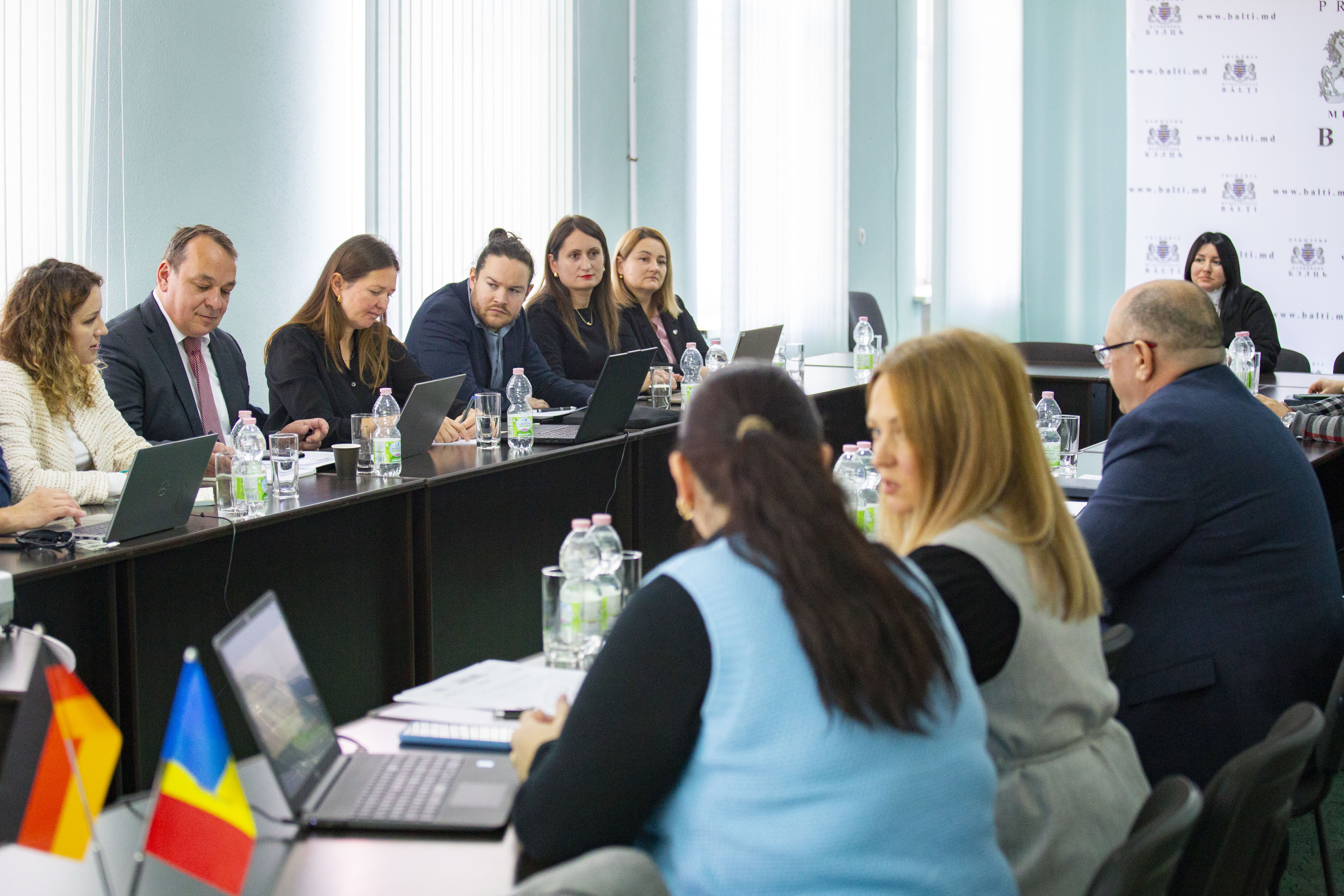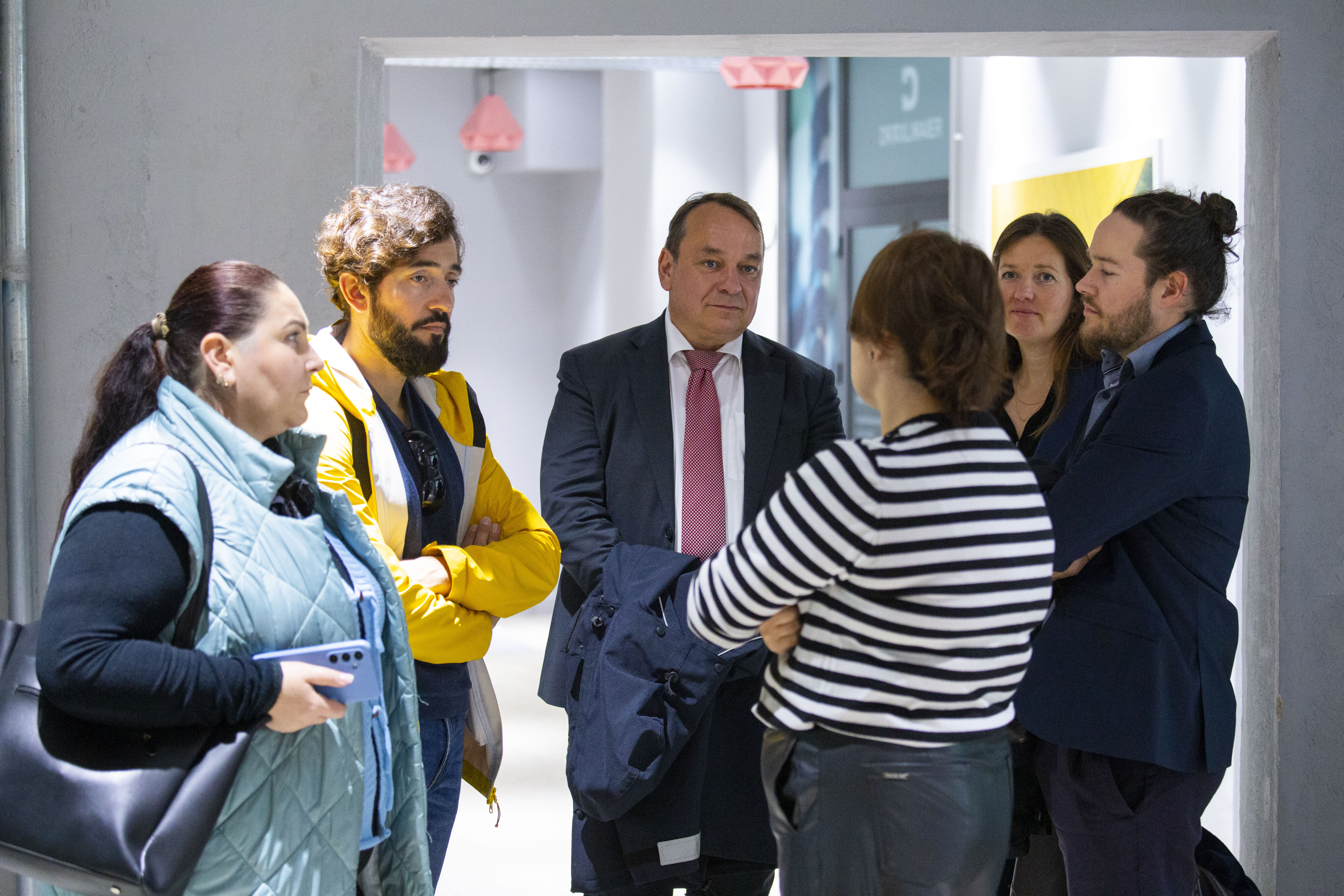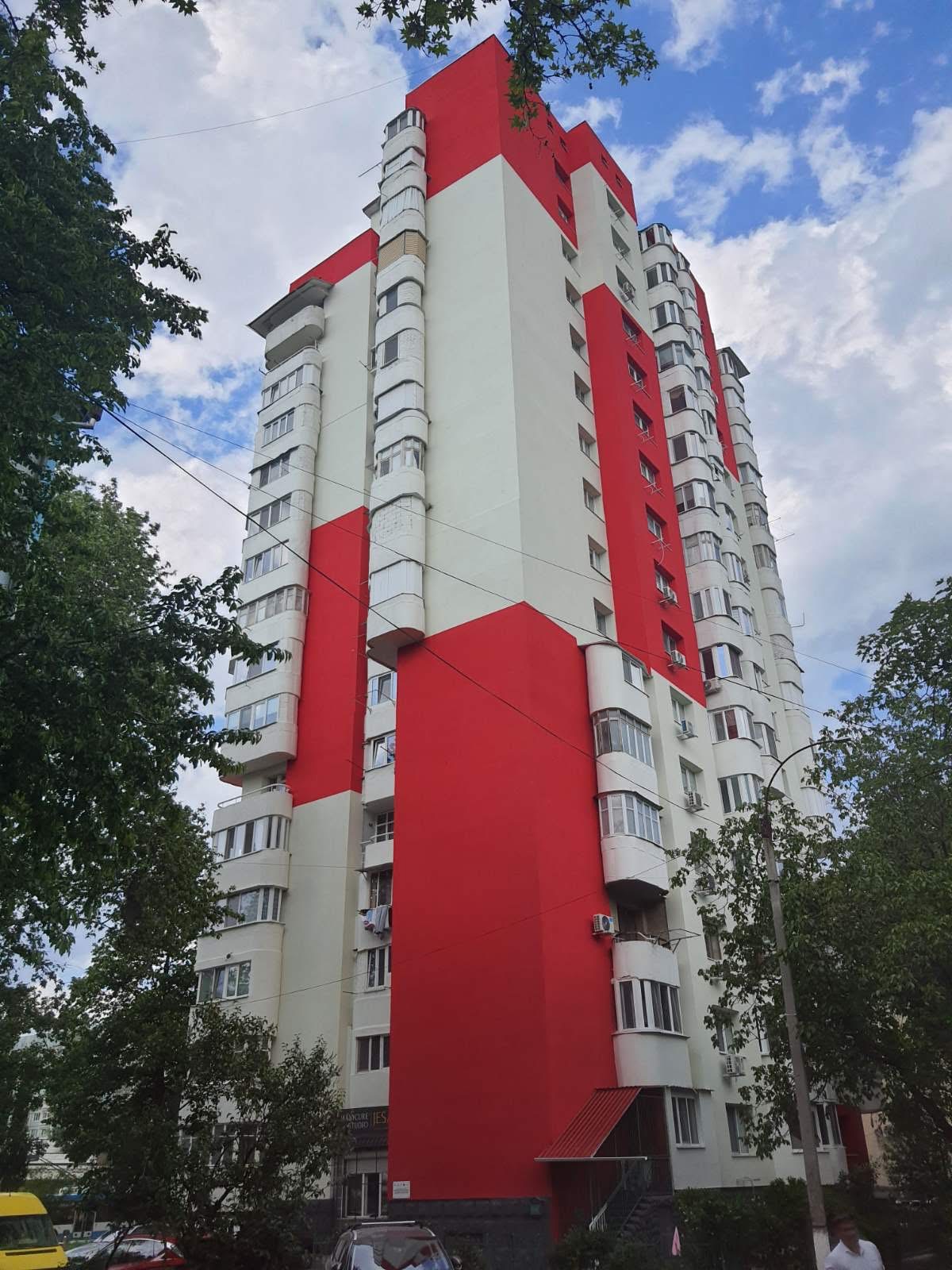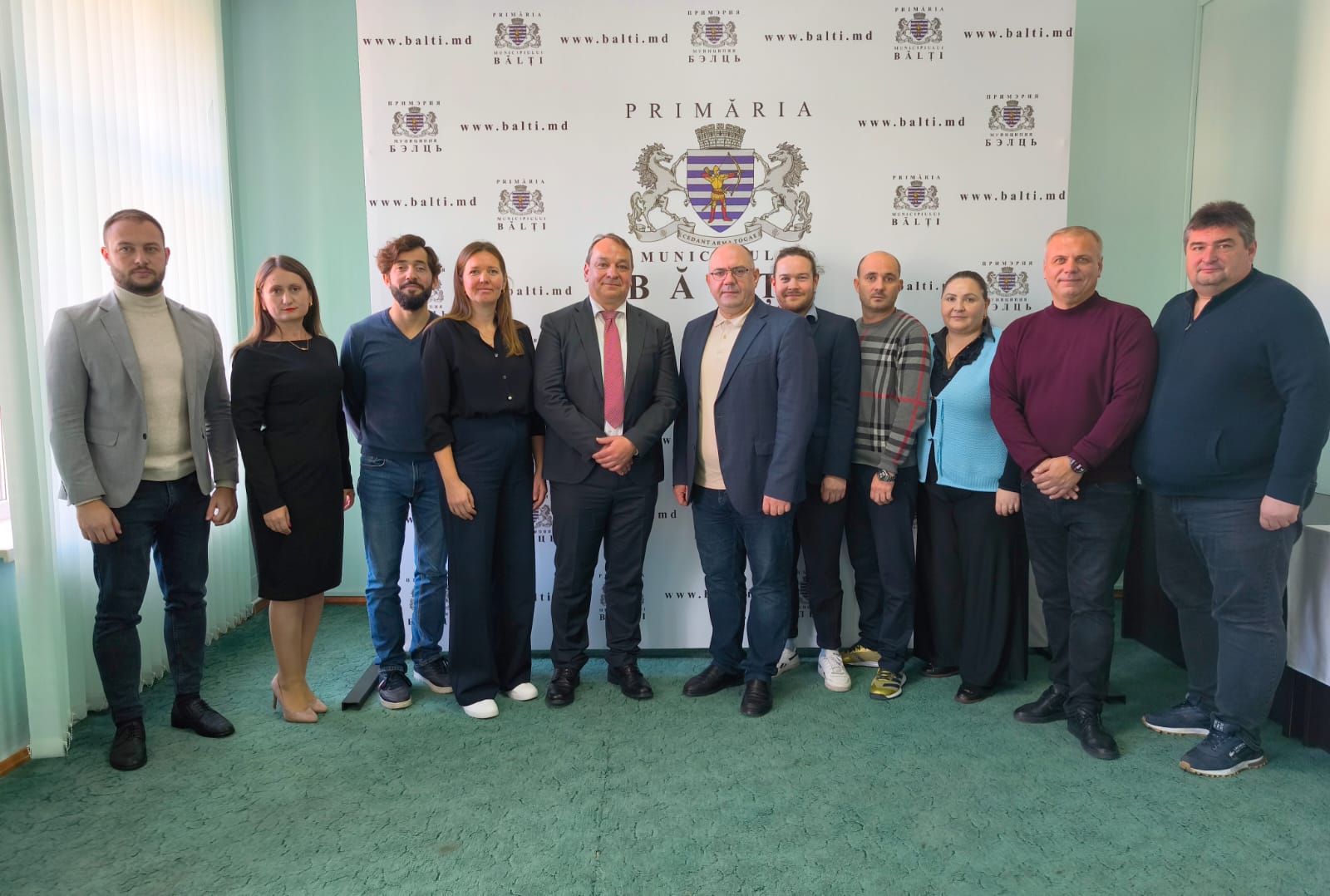Energy transition and EU rapprochement in Moldova
The city of Bălți and the Republic of Moldova are undergoing change: after the country elected a new parliament on 28 September and the pro-European party once again secured an absolute majority, a delegation from Stuttgart visited the northern Moldovan city of Bălți around two and a half weeks later. As part of the Energy Transition Town Twinnings 3.0 (EWPS 3.0) project, the steps taken so far were summarised and an outlook on the ambitions of the city of Bălți was given.
Andreas Neft, head of the Office for Environmental Protection, and Albine Oster, employee of the office, visited from Stuttgart. They were accompanied by Dominik Enkelmann, project manager at the Renewable Energy Agency (AEE), and Evgheni Camenscic, energy expert at the German Society for International Cooperation (GIZ) in the Republic of Moldova. After arriving at Chişinău Airport on 14 October, the city's birthday, the delegation took the opportunity to visit the fair celebrating the day and to get their first impressions of the country before travelling about 130 kilometres north. A joint dinner provided a cheerful reunion with the representatives from Bălți.
 On the mornings of Wednesday and Thursday, the delegations met to present the steps taken so far in the project and to explore future developments. In addition to the project partners, the mayor of the town of Bălți, Alexandr Petkov, several deputy mayors and city councillors attended. In addition to presenting the local GIZ projects related to the Climate City Gap Fund, Learning Energy Efficiency Network (LEEN) and Felicity, urban energy management played a special role in the discussions. Based on the successes of Stuttgart's long-standing energy management system, a version for the city of Bălți was developed as part of the project using the Stuttgart Energy Directive. The directive was presented during the workshop and is about to be published. In addition, GIZ funds were used to employ energy managers from the Moldovan NGO CONSENS, who will be responsible for advancing urban energy policy developments in line with the Energy Guideline in the future. Albine Oster presented Stuttgart's energy management success story, Evgheni Camenscic reported on local developments, and Andreas Neft urged Mayor Alexandr Petkov to treat the energy transition as a top priority and thus build long-term and targeted commitment.
On the mornings of Wednesday and Thursday, the delegations met to present the steps taken so far in the project and to explore future developments. In addition to the project partners, the mayor of the town of Bălți, Alexandr Petkov, several deputy mayors and city councillors attended. In addition to presenting the local GIZ projects related to the Climate City Gap Fund, Learning Energy Efficiency Network (LEEN) and Felicity, urban energy management played a special role in the discussions. Based on the successes of Stuttgart's long-standing energy management system, a version for the city of Bălți was developed as part of the project using the Stuttgart Energy Directive. The directive was presented during the workshop and is about to be published. In addition, GIZ funds were used to employ energy managers from the Moldovan NGO CONSENS, who will be responsible for advancing urban energy policy developments in line with the Energy Guideline in the future. Albine Oster presented Stuttgart's energy management success story, Evgheni Camenscic reported on local developments, and Andreas Neft urged Mayor Alexandr Petkov to treat the energy transition as a top priority and thus build long-term and targeted commitment.
 Further presentations and visits to the city in the afternoons highlighted the motivation of various local stakeholders. Veronica Garbuz, representative of the energy supplier CET-Nord, presented the company's role for the city, Valeriu Grumeza, head of a vocational school, showed how the school is independently making its energy supply more sustainable and training students for the energy transition, and Serghei Meleca, owner of an apartment block, reported on how the building was renovated to be more energy efficient. The 17-storey building, which shines in striking red and white following the renovation, was refurbished with the help of various European funding programmes and is considered a pioneer in Bălți. The switch from vertical to horizontal heating has already led to savings of 38 per cent and will be further enhanced by insulation. During the subsequent visit to the building, Serghei Meleca reported on the challenges, such as the need for subsidies and the complications arising from the ownership structure of the residential units. Many apartment owners renovate their apartments individually, rather than waiting for the renovation of the whole apartment complex.
Further presentations and visits to the city in the afternoons highlighted the motivation of various local stakeholders. Veronica Garbuz, representative of the energy supplier CET-Nord, presented the company's role for the city, Valeriu Grumeza, head of a vocational school, showed how the school is independently making its energy supply more sustainable and training students for the energy transition, and Serghei Meleca, owner of an apartment block, reported on how the building was renovated to be more energy efficient. The 17-storey building, which shines in striking red and white following the renovation, was refurbished with the help of various European funding programmes and is considered a pioneer in Bălți. The switch from vertical to horizontal heating has already led to savings of 38 per cent and will be further enhanced by insulation. During the subsequent visit to the building, Serghei Meleca reported on the challenges, such as the need for subsidies and the complications arising from the ownership structure of the residential units. Many apartment owners renovate their apartments individually, rather than waiting for the renovation of the whole apartment complex.
 Additional visits took place during the two days at a German automotive electronics supplier and at the nortek innovation campus, which is affiliated with Alecu Russo University and develops innovative ideas and spaces through collaboration between science, private industry and community engagement, making it a novelty in Bălți. On Thursday afternoon, the delegation visited the local Divin distillery Barza Albă before heading to the final dinner. On the way back to Chișinău Airport, on Friday the German delegation did a little bit of sightseeing at the archaeological site and cave monastery of Orheiul Vechi and in downtown Chișinău before the group separated. However, the farewell was marked by a look ahead to the final digital workshops of the project, the closing event in Brussels and the hope that the future will bring further opportunities for cooperation.
Additional visits took place during the two days at a German automotive electronics supplier and at the nortek innovation campus, which is affiliated with Alecu Russo University and develops innovative ideas and spaces through collaboration between science, private industry and community engagement, making it a novelty in Bălți. On Thursday afternoon, the delegation visited the local Divin distillery Barza Albă before heading to the final dinner. On the way back to Chișinău Airport, on Friday the German delegation did a little bit of sightseeing at the archaeological site and cave monastery of Orheiul Vechi and in downtown Chișinău before the group separated. However, the farewell was marked by a look ahead to the final digital workshops of the project, the closing event in Brussels and the hope that the future will bring further opportunities for cooperation.


Social Media